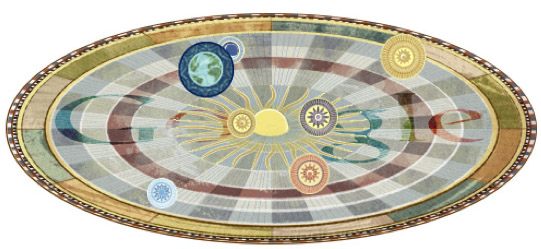Above is a screen capture of the “Google Doodle” for today. It honors the 540th birthday of Nicolaus Copernicus, proponent of the heliocentric model of the universe. Note that Google is placing itself in the center of the universe, a decision I suspect was made very deliberately for its symbolism.
Astronomy was the first scientific discipline to make extensive use of data. Many of the early advances in data analysis and statistics (like the Gaussian Distribution) came about through detailed observations of heavenly bodies and the vast quantities of (imprecise) data this generated. Astronomy may have even given us the first murder over scientific data. With its Doodle, Google is saying that it’s become the center of the data universe, the dominant lens through which we view the world.
A bold claim! Is it true? Looking closely at all the ways in which Google has integrated itself into our online and offline lives, and it starts to look less like presumption on their part, and more like a simple acknowledgement of present reality.
How does Google guide and track and thee? Let me count the ways:
- With search, of course. This includes every character you type into the search box or toolbar, since these are sent to Google for auto-complete and search suggestions. If you’ve ever accidentally pasted a password or a whole draft of your book in progress into the search box, Google has a copy of this stored in their vast data center.
- Through your email, if you use Gmail, but also if you email other people who use Gmail.
- Every Youtube video you watch.
- Your location information, if you use Google Maps. Also, if you are like most people, Google knows the house (or at least the neighborhood) you grew up in, since this is the first place you zoomed-in on that wasn’t your current location. Even if you don’t visit the Maps website or app directly, there’s a good chance a Google Map is embedded in the website of your real estate agent or the restaurant you just checked out.
- Through tracking for Analytics. This is a little javascript nugget webmasters put on their pages to get information about their visitors. Millions of websites use Google Analytics, including this one.
- Through Adsense, those Google-style ads you see on the side of pages which aren’t Google itself. Adsense is by far the most popular “monetizing” solution for webmasters.
- If you use voice dictation on an Android phone, your sounds get sent to Google for conversion into words. Your Android phone is also likely to integrate your calender with Google’s online calender app, sending data about your daily schedule back and forth.
- If you use Chrome, then all of the URLs you visit are sent to Google as you type, for auto-complete. Many people use the search box itself to type in URLs, giving this info to Google.
- Google has a dozen other products that most of us use at least occasionally, from News to Blogsearch to Translate to Google Docs to Google+ social networking.
Is there any way to escape the pull of Google’s gravity? There are some things you can do to limit the amount of tracking Google does, like clear your cookies on a regular basis, or block Google Ads and Analytics by using your computer’s “hosts” file, but the harder you work to keep your personal data off Google’s servers, the more you end up pushed to the fringes of cyberspace and in some ways from modern life itself: ignoring emails from friends on Gmail, unexposed to the viral video everyone else in your office is talking about, adrift without a good virtual map of the human universe.
Do we welcome our new Sun King?

